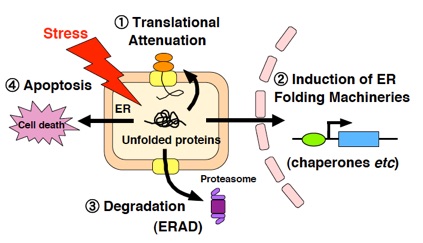Copyright© 2011 Oyadomari Lab All rights reserved.



0
Endoplasmic reticulum (ER) is the site of synthesis and folding of secretory proteins. Perturbations of ER homeostasis affect protein folding and cause ER stress. ER can sense the stress and respond to it through gene expression program so called ER stress response. The ER stress response has four functional components (Figure). The first is translational attenuation, which inhibits protein synthesis, an adaptation aimed at lowering the load of client proteins the ER must process. The second is the transcriptional upregulation of the folding machineries in the ER to process client proteins. The third is enhancing degradation of misfolded protein in the ER, which is called ER-associated degradation (ERAD). The fourth is apoptosis, which occurs when the ER function is severely impaired. ER stress response is important for normal cellular homeostasis and development and suggested to involve in the pathogenesis of many diseases. We have shown that pancreatic beta-cells (which produce the hormone insulin) are highly susceptible to ER stress and mal-adaptation to ER stress causes diabetes.

The functional components of the ER stress response. Accumulation of unfolded proteins in the ER activates four cellular responses.

Diabetes is emerging as one of the most serious health problems in the world. Diabetes develops when a critical number of pancreatic beta-cells become damaged or die. We speculate that ER stress is occurred in pancreatic beta-cells by overworking and overproducing insulin in pre-diabetic obesity. The high levels of ER stress for long time will lead pancreatic beta-cells into exhaustion or death. We hypothesize ER stress may be main contributor to the development of diabetes. The long-term goal of our research is to understand the role of ER stress response in metabolism regulation and to integrate these into an understanding of the pathogenesis of diabetes and other ER stress-related diseases. We expect that our work may eventually provide new targets for prevention and treatment of diabetes, as well as other ER stress-related disease. We are welcoming everyone who is interested in joining us in our endeavor to unravel the great mystery of nature.










Division of Molecular Biology
Institute of Advanced Medical Sciences, Tokushima University







Role of endoplasmic reticulum stress response in metabolism regulation
